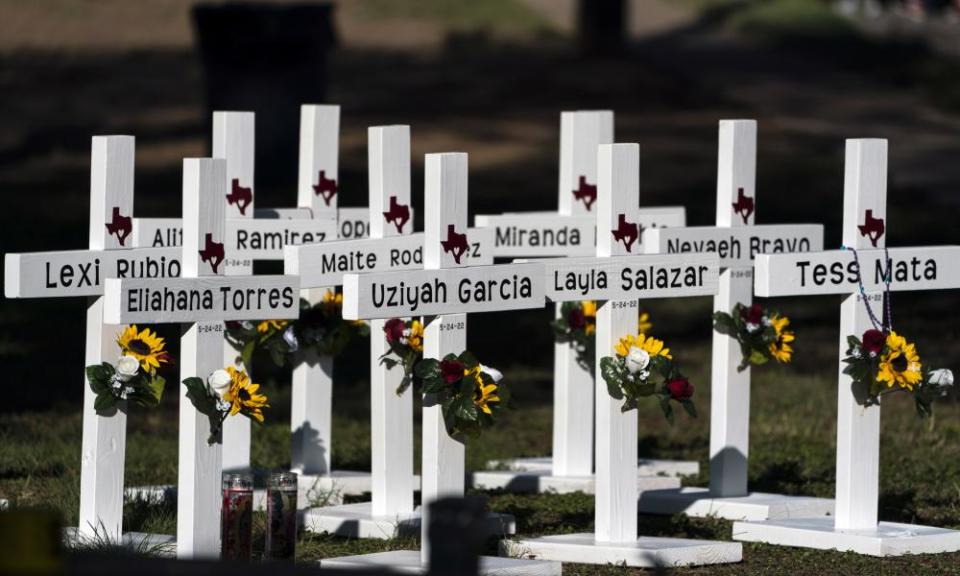Gun reformers feel history is on their side despite bleak outlook in Congress

When Joe Biden signed the Bipartisan Safer Communities Act into law this summer, he and congressional Democrats celebrated the enactment of the first significant gun control policy in decades in the US.
The US president also acknowledged that the law, a bipartisan compromise brokered after the Uvalde tragedy that left 19 children and two adults dead, did not go nearly far enough to address the devastation caused by gun violence.
“I know there’s much more work to do, and I’m never going to give up,” Biden said in June.
Although Democrats and activists agree that much more needs to be done to combat gun violence, legislative progress on this lightning-rod issue could soon become even more difficult. With crucial midterm elections looming, the prospect of meaningful progress on gun reform now looks unlikely – despite widespread domestic revulsion at continuing gun violence and bafflement overseas at the US gun problem.
If Republicans regain control of the House of Representatives after the midterm elections this November, as they are favored to do, proposed gun regulations will probably be dead on arrival in Congress. Despite those obstacles, anti–gun violence activists and their allies on Capitol Hill insist they are not giving up on their goal to see more desperately needed change in the months and years to come.
The Democratic senator Chris Murphy, who played a leading role in negotiations over the BSCA, said on Tuesday that he considers the law to be proof of potential bipartisan cooperation on gun regulations.
The compromise secured by Murphy and the Republican senator John Cornyn expanded background checks for firearm buyers under the age of 21, and it enacted new gun restrictions for those previously convicted on domestic violence charges. The legislation also provided financial incentives for states to enact “red-flag laws”, which help keep guns away from those deemed to be a danger to themselves or others, and it provided funding for more mental health services to children and families.
Speaking at an event in Washington organized by the Common Ground Committee, Murphy credited the anti–gun violence movement and an engaged citizenry in forcing Congress to finally act nearly a decade after the shooting at Sandy Hook elementary school in his home state of Connecticut.
“The reason that we found common ground this summer is because the American public had had enough of inaction,” Murphy said at George Washington University. “While Sandy Hook shook this country to the core, it’s really been the cumulative impact of mass shooting after mass shooting, as well as suicides and homicides continuing to spiral upward, that brought the public to a point this summer where they just weren’t willing to accept Congress retreating to their corners.”
But while the passage of the BSCA offered some hope for supporters of stricter gun laws, the negotiation process also displayed the sharp partisan divides on this polarizing issue. Just 14 House Republicans supported the bill, while 193 opposed it. After playing a leading role in the negotiations over the bill, Cornyn was booed and heckled at a Republican convention in his home state of Texas.
Former Republican congressman Will Hurd, who joined Murphy at Tuesday’s event, acknowledged the political pressure that members of his party face from some voters when they back new gun restrictions. Nodding to the widespread public support that policies like universal background checks and a higher age limit for gun purchases enjoy, Hurd encouraged his former colleagues to take proactive steps to prevent future tragedies.
“This is something that people want to see happen and so don’t be afraid of some of these issues that might have had a different political constituency in the 90s,” Hurd told reporters after the event. He added, “It always requires political courage to do something that’s difficult and that is not embraced by everybody.”
As of now, House Republicans have shown little interest in taking up new gun regulations if they regain control of the chamber in November. Even if Democrats retain control of the Senate, Republicans would be able to block any gun control bill in the House if they have the majority.
But Hurd, who previously represented the Uvalde community in the House, said political pressure could change the calculus for Republican lawmakers if a similar tragedy occurs again.
“If a terrible action like this happens in the future and there’s not going to be a response, I think you’re going to see a public backlash,” Hurd said.
That grim possibility is a near certainty in the US, as Tuesday’s event vividly demonstrated. One audience member who posed a question to Murphy and Hurd said that he was a survivor of the Highland Park shooting, which left seven people dead. The attack unfolded just days after Biden signed the BSCA into law.
In the face of such tragedy, anti–gun violence activists have doubled down on their commitment to push for more reform, regardless of who controls Congress after November.
Murphy echoed that commitment, even as he conceded that Congress was unlikely to pass another gun control bill this year. Praising the anti–gun violence community as “one of the great social change movements in the history of this nation,” Murphy said he and his allies were just getting started.
“All of those great social change movements that you read about in the history books, they failed a whole bunch of times before they ever changed the world,” Murphy said. “My hope is based upon the history books, which tell you – when your cause is right and you choose not to give up, in this country, in a democracy – you eventually prevail.”

 money
money 